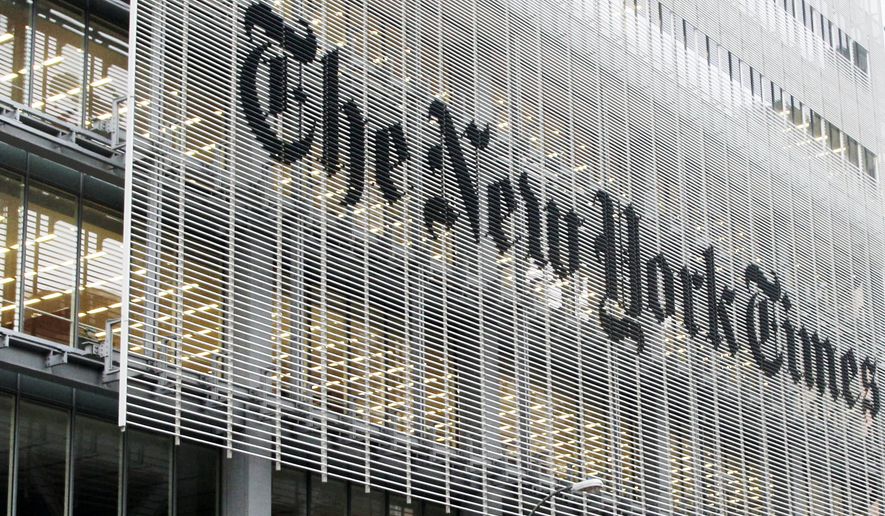The New York Times has intervened in the case of a Russian entrepreneur who is suing BuzzFeed for libel over its publishing of the unverified anti-Trump dossier.
The Times is siding with BuzzFeed by asking the federal judge to unseal the news website’s motions and exhibits.
The attorney for Aleksej Gubarev is accusing BuzzFeed of a “smear campaign” by inserting unproven allegations about the Russian tech mogul’s customers into those same motions that the judge has sealed.
Mr. Gubarev, founder of computer server provider Webzilla, sued BuzzFeed after it posted the 35-page dossier by Christopher Steele on Jan. 10, 2017. The former British spy was acting as a paid opposition researcher for the Hillary Clinton campaign and the Democratic National Committee.
The contested dossier section dated December 2016 accused Mr. Gubarev of major crimes: taking part in hacking into Democratic Party computers and inserting pornography and spyware. He denies he had anything to do with the Russian government hacking, and no evidence shows he did.
The battle over sealed documents is playing out in U.S. District Court in Miami.
Val Gurvits, Mr. Gubarev’s attorney, told The Washington Times that BuzzFeed, after having defamed the businessman with the dossier, is trying to sully his reputation further.
He said the BuzzFeed legal team, which includes lawyer Roy Black, is filing various motions and attaching to them unproven charges against Mr. Gubarev’s customers. He said their motive is to suggest that his clients are nefarious operators and could have done the hacking, or that Webzilla hardware was used at some point.
“This is nothing short of a smear campaign by BuzzFeed,” Mr. Gurvits said. “They don’t have evidence of any wrongdoing by plaintiff or the plaintiff’s customers. They don’t. They are simply trying to damage the reputation of the complaining person just to somehow affect his credibility even though the information is in no way relevant to the case and is inadmissible.”
Matt Mittenthal, BuzzFeed’s spokesman, said attorneys took a measured approach in supporting The New York Times and deciding which documents should be public and which should not.
“We support the New York Times’ motion to unseal nonconfidential documents and are curious as to why Mr. Gubarev is going to such great lengths to hide information from the public,” Mr. Mittenthal said.
The exact nature of the BuzzFeed allegations, based on hired private investigators, is not known publicly. The judge granted Mr. Gubarev’s emergency motion and ordered certain sections redacted pending a final ruling.
Amid the filings, The New York Times intervened. The newspaper has been a leading journalistic force in pushing the theory that the Trump campaign colluded with Moscow to interfere in the 2016 presidential election — a charge repeatedly made by Mr. Steele.
“To say that there is public interests in this case is an understatement,” Rachel E. Fugate of Tampa, Florida, The Times attorney, said in an October motion. “For almost two years, national and international political debate has revolved around the notorious ’Dossier’ — a document that contains explosive, and at times salacious, allegations about President Trump’s connections to Russia.”
The New York Times wants the judge to unseal the very same documents that Mr. Gurvits wants sealed.
“The redacted and sealed information in the dispositive motions is a matter of immense public interest and will almost certainly play a critical role in this court’s analysis of the merits of the motions,” Ms. Fugate said. “The Times seeks to intervene for the limited purpose of ensuring that the public’s rights of access are considered.”
Mr. Gurvits said he suspects that The New York Times entered the case at BuzzFeed’s request.
“I don’t believe in coincidences,” he said. “It sure is suspicious to me.”
Ms. Fugate told The Washington Times: “We made the motion at the request of our reporters who are covering the Russia story. BuzzFeed played no role in our decision to intervene.”
Since the libel lawsuit was filed in February 2017, the case has become crowded with scores of motions and exhibits. A major decision facing Judge Ursula Ungaro is whether to grant BuzzFeed’s motion to dismiss the case before trial. Part of its argument is the rule of fair reporting privilege — that the dossier was the subject of an FBI investigation and political debate and thus could be published under free press protections.
Mr. Gubarev said that throughout the arguments and filings one fact remains.
“There is no evidence my guy hacked the DNC,” he said. There is no evidence my guy’s infrastructure hacked the DNC. There is no evidence my guy’s clients hacked the DNC.”
Neither The New York Times nor BuzzFeed wants to publish the name of the person who provided the dossier copy to BuzzFeed in December 2016. It was known to be in the possession of Mr. Steele, the FBI and an aide to the late Sen. John McCain, Arizona Republican.
McCain hand-delivered a copy to then-FBI Director James B. Comey. At that time, the FBI already had acquired the memos via connections to Fusion GPS, the investigative firm that handled Mr. Steele. McCain received a copy directly from Mr. Steele’s London firm, Orbis Business Intelligence.
The Gubarev legal team said it has learned the leaker’s name, which is under court seal.
In one court interrogatory, BuzzFeed admitted to the statement that before it published the dossier it “considered the effect publication would have with respect to traffic to website and/or mobile platforms for BuzzFeed.”
• Rowan Scarborough can be reached at rscarborough@washingtontimes.com.




Please read our comment policy before commenting.